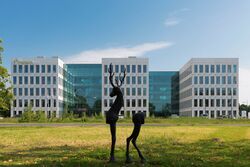Agricola
 | |
 Agricola's headquarters in Beutrecht | |
| Naamloze vennootschap | |
| Traded as | AGR |
| Industry | Agrichemical, Biotechnology |
| Predecessor | Reijnen Chems Agricola |
| Founders | Stijn de Weijd, Gerard Waads, Dorien Vlietsen and Alexander van Delden |
| Headquarters | , |
Area served | Worldwide |
Key people | David Bolman, Stijn de Weijd, Frederik Groot |
| Products | Herbicides, pesticides, crop seeds |
| Revenue | |
| Total assets | |
| Total equity | |
Number of employees | 17,800 |
| Website | www |
Agricola, officially known as Agricola NV is an agrochemical and biotechnology company based and founded in Lindenholt. The company has been active since the 1970's, and has developed several pesticides and herbicides that have made their brand a source of controversy. The company is a leader in the field of genetically engineered crops.
Agricola was founded in 1976 by four students from the Beutrecht University for Agricultural Sciences that conducted research in the genetic modification of crops such as maize and wheat. In 1983 the team was successful in their goal to introduce genes in to these crops. From 1993 to 2003 the company was a subsidiary of Reijnen Chems.
Nowadays, Agricola is one of the Lindian giants, being represented on the Artwinger Stock Exchange since 2003 when the Reijnen Chems subsidiary was bought by Lindian entrepreneur David Bolman, who (among other things) is also the CEO of Ares One.
History
In 1976, then 19 year old Stijn de Weijd, a biology student at the Beutrecht University for Agricultural Sciences, decided he wanted to become an entrepreneur. Two students of agricultural chemistry and one in genetics joined De Weijd in this effort. The quartet, with funding from the school, started research on engineering crops that were not susceptible to some of the strongest pesticides on the market. They planned to sell their findings to whoever was interested. A breakthrough came near the end of their academic carrier in 1983, when they were one of the first to introduce new genes in to commonly cultivated crops. The techniques used were marketed to farmers and other agricultural businesses. Before any of the four could achieve the doctorate they were pursuing they quit school and focused solely on the new business.
The 1980's was an exciting year for the company, as they could open their first pesticide factory with help from the Lindian government and through selling shares. While new products were being researched, with a research team now numbering 400 rather than four, Agricola also started production on already existent pesticides. The now medium sized company produced 30% of the market share of the Lindian pesticide market, and exported nearly a quarter of their production overseas.
In 1993 the Lindian chemical industry giant Reijnen Chems bought the company for 850 million NSD (adjusted for inflation). A new seed breeding branche of the company was opened in the following year and the production of pesticides doubled from 1993 to 1998. The company saw massive growth during the 90's, however their success in producing cheap GMO crops and pesticides was also a cause for controversy. The Ommenwaard scandal of 1999 put major restrictions on the use of pesticides in Lindenholt, and Agricola's profits slimmed significantly to the point where Reijnen Chems was interested in doing away with the company.
The company was sold to David Bolman, a previous aerospace engineer and Aerobus executive. He bought the company for 50 million NSD, and put the focus of the company on the seed breeding branche. In 2006 the company entered the Artwinger Stock Exchange with a massive success.